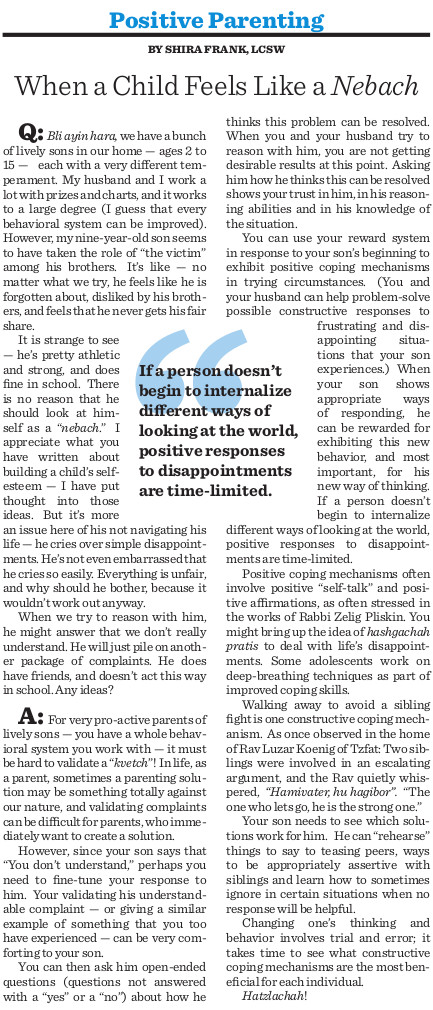Q: Bli ayin hara, we have a bunch of lively sons in our home — ages 2 to 15 — each with a very different temperament. My husband and I work a lot with prizes and charts, and it works to a large degree (I guess that every behavioral system can be improved). However, my nine-year-old son seems to have taken the role of “the victim” among his brothers. It’s like — no matter what we try, he feels like he is forgotten about, disliked by his brothers, and feels that he never gets his fair share.
It is strange to see — he’s pretty athletic and strong, and does fine in school. There is no reason that he should look at himself as a “nebach.” I appreciate what you have written about building a child’s self-esteem — I have put thought into those ideas. But it’s more an issue here of his not navigating his life — he cries over simple disappointments. He’s not even embarrassed that he cries so easily. Everything is unfair, and why should he bother, because it wouldn’t work out anyway.
When we try to reason with him, he might answer that we don’t really understand. He will just pile on another package of complaints. He does have friends, and doesn’t act this way in school. Any ideas?
A: For very pro-active parents of lively sons — you have a whole behavioral system you work with — it must be hard to validate a “kvetch”! In life, as a parent, sometimes a parenting solution may be something totally against our nature, and validating complaints can be difficult for parents, who immediately want to create a solution.
However, since your son says that “You don’t understand,” perhaps you need to fine-tune your response to him. Your validating his understandable complaint — or giving a similar example of something that you too have experienced — can be very comforting to your son.
You can then ask him open-ended questions (questions not answered with a “yes” or a “no”) about how he thinks this problem can be resolved. When you and your husband try to reason with him, you are not getting desirable results at this point. Asking him how he thinks this can be resolved shows your trust in him, in his reasoning abilities and in his knowledge of the situation.
You can use your reward system in response to your son’s beginning to exhibit positive coping mechanisms in trying circumstances. (You and your husband can help problem-solve possible constructive responses to frustrating and disappointing situations that your son experiences.) When your son shows appropriate ways of responding, he can be rewarded for exhibiting this new behavior, and most important, for his new way of thinking. If a person doesn’t begin to internalize different ways of looking at the world, positive responses to disappointments are time-limited.
Positive coping mechanisms often involve positive “self-talk” and positive affirmations, as often stressed in the works of Rabbi Zelig Pliskin. You might bring up the idea of hashgachah pratis to deal with life’s disappointments. Some adolescents work on deep-breathing techniques as part of improved coping skills.
Walking away to avoid a sibling fight is one constructive coping mechanism. As once observed in the home of Rav Luzar Koenig of Tzfat: Two siblings were involved in an escalating argument, and the Rav quietly whispered, “Hamivater, hu hagibor”. “The one who lets go, he is the strong one.”
Your son needs to see which solutions work for him. He can “rehearse” things to say to teasing peers, ways to be appropriately assertive with siblings and learn how to sometimes ignore in certain situations when no response will be helpful.
Changing one’s thinking and behavior involves trial and error; it takes time to see what constructive coping mechanisms are the most beneficial for each individual.
Hatzlachah!

